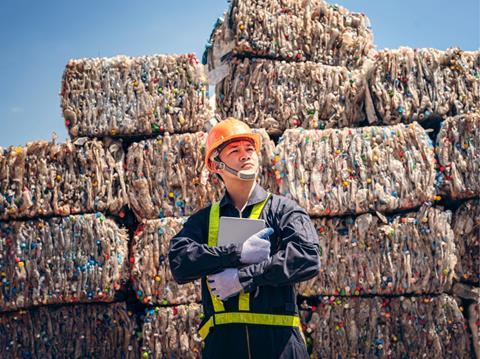
Reflecting on a decade of progress and learnings, Rob Opsomer, Executive Lead for Plastics at the Ellen MacArthur Foundation, calls on companies to join industry leaders in getting behind its 2030 agenda in a bid to tackle plastic packaging waste and build a circular economy.
Now what? This is a question I’ve been asked time and again by business leaders over the past 18 months looking to drive change in the plastics system.
We are at a crossroads. In tackling global challenges, early optimism of what’s possible is increasingly colliding with the hard truths of scaling solutions in a fast-changing and uncertain world. Many businesses are now asking what comes next; how to build on the progress made so far, and how to navigate the complexities of implementation at scale.
Our new 2030 Plastics Agenda for Business aims to answer these questions. Applying a decade of progress and learnings on what has – and hasn’t – worked, it offers an evidence-based, practical blueprint for business to tackle plastic waste and pollution.
Over the past 10 years, I’ve seen meaningful progress in the fight against plastic waste – but I’ve also learned that no company can solve the crisis alone. That is why, more than ever, we are urging companies to go beyond their own footprint to work together to shape wider market transformation.
In 2018, a group of businesses representing 20% of the global plastic packaging market came together behind shared ambitions in the Ellen MacArthur Foundation’s Global Commitment, launched in partnership with UNEP.
Since then, this 20% have compellingly demonstrated solutions exist and progress possible. Collectively, they have avoided 14 million tonnes of virgin plastics – the equivalent of about two trillion plastic bags.
Unfortunately, this is not enough. Having 20% of the market step up is fantastic, but it also means 80% have not – and the numbers show this group lags far behind those who have. Moreover, even the most ambitious businesses face systemic barriers they cannot overcome alone: scaling reuse models, tackling flexible packaging waste, and building effective collection and recycling infrastructure.
This is why we need a new approach, with businesses looking beyond their own footprint to collectively shape the wider market around them to make progress go further and faster.That’s exactly what this 2030 agenda is about. The 2030 agenda has three mutually reinforcing pillars to accelerate change. Firstly, collective advocacy – a shared voice from business to call for ambitious, effective and harmonised policy, both to get the 80% not moving to step up and to support the leaders in their ambitions.
Secondly, new forms of collaborative industry action to share risks, costs, and innovation to overcome barriers. And thirdly, continued aligned individual action with each company taking bold steps within their own walls to prove what’s possible and to inspire policy and market change.
Already we are seeing many leading businesses getting behind our 2030 Agenda.Even as the context in which companies set public targets has become more complex, businesses representing again about 20% of the global plastic packaging market – including Amcor, Borealis, Colgate-Palmolive, Danone, L’Oréal, Nestlé, SC Johnson, PepsiCo, TOMRA, and Unilever – are stepping up and reaffirming their support to the Ellen MacArthur Foundation’s Global Commitment 2030, one of three pillars of the agenda.
More than 300 businesses are already calling for ambitious, globally harmonised policy as part of the Business Coalition for a Global Plastics Treaty. As we await next steps on the Treaty, we continue to call on governments to step up and create the harmonised regulation that will unlock scaling of solutions, and on business to continue advocating for positive change.
Meanwhile, we are working with industry leaders on creating a next generation of collaborative action to lower the cost and risk of the transition on reuse, flexibles, and infrastructure.
Our destination is clear. A circular economy, where we eliminate the plastics we don’t need, innovate towards reuse models and new materials, and circulate the plastics we still use. This is the most effective way to tackle plastic pollution – offering profound benefits for the economy and for nature, as well as for people and societies.
We know it’s business-critical to get this right. Companies who lean in will be well positioned to co-shape the future, stay ahead of regulation, and ensure continued market access. Those who don’t risk being disrupted.
We also know the impact that a group of leading businesses and governments can have by acting towards a common vision. This agenda represents the next chapter in our collective journey tackling one of the great challenges of our time.
I invite you to join the many industry leaders already rallying behind it.
If you liked this story, you might also enjoy:
The ultimate guide to the Packaging and Packaging Waste Regulation in 2025
How are the top brands progressing on packaging sustainability?
Everything you need to know about global packaging sustainability regulation in 2025
The key to increasing the use of reusable packaging in supermarkets














No comments yet